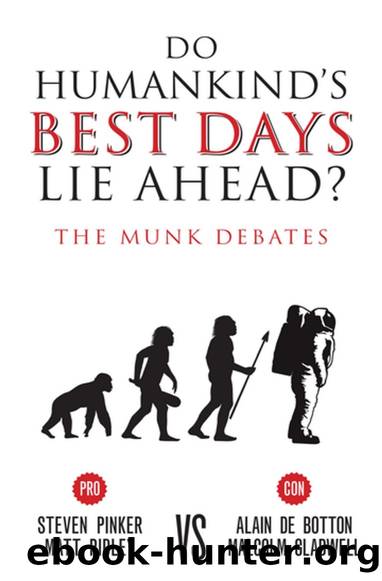Do Humankind's Best Days Lie Ahead? The Munk Debates by Steven Pinker

Author:Steven Pinker [Pinker, Steven]
Language: eng
Format: epub
ISBN: 9781487001698
Google: 2O5LDAAAQBAJ
Barnesnoble:
Publisher: House of Anansi Press Inc
Published: 2016-05-31T20:12:16+00:00
Pre-Debate Interviews
malcolm gladwell in conversation
with rudyard griffiths
Rudyard Griffiths: Welcome to our pre-debate interviews for the Munk Debate on Progress. Weâll be debating the resolution, âBe it resolved: humankindâs best days lie ahead.â Arguing against the motion will be Malcolm Gladwell, internationally bestselling author and staff writer at the New Yorker. Malcolm, letâs start by having you unpack some of the key arguments that youâll be putting on the table tonight. I think you may be running a little bit against the current of our culture right now, where thereâs so much excitement around technology and some of the big global forces that are revealing themselves.
Malcolm Gladwell: Yeah, and I think itâs important to distinguish that we can make progress in individual areas without necessarily being better off as a whole, right? So, I imagine the other side is going to provide the specific incidences where we genuinely are better off than we were in the past, and where every expectation is we will continue to improve in the coming years. And I will concede all that to them â theyâre absolutely right. I can sit here and simply list things that I think will get better in the future, but that doesnât even begin to answer the question of whether we will be better off as a whole in five, ten, or twenty-five years from now.
Iâm more interested in questions like, When you make progress against an individual problem do you create additional problems? What are those additional problems, and are those new problems bigger, the same as, or less than the problems youâve just solved?
Rudyard Griffiths: Atomic weapons would be a great example. If we want to light up cities we can blow up cities.
Malcolm Gladwell: Exactly.
Rudyard Griffiths: We invent nanotechnology, weaponize it, and it wipes us out. Is it that kind of dual use in a lot of technology that worries you?
Malcolm Gladwell: As technology and some other areas progress, the size and the catastrophic nature of the flipside grow exponentially. So for every huge leap you make in one area, you also create a huge leap in, for example, the ability of humankind to destroy itself.
I think itâs important for us, for my side, to not come across as pessimists. We can be the furthest thing from it. And my position is simply that the world is different, and as we go forward, I donât know whether weâre better off or worse off. It strikes me that the other sideâs incumbent to prove the proposition. I simply have to shrug, and if the audience agrees that we ought to shrug, we win.
Rudyard Griffiths: A very French debate. Tell me about human progress in relation to morality. There is an argument out there that weâre not only improving the external world, but that weâre somehow improving ourselves. Steven Pinker is one of its key proponents.
Malcolm Gladwell: Pinkerâs argument, which he expresses in his book The Better Angels of Our Nature, is at once commonplace and also utterly beside the point.
Download
This site does not store any files on its server. We only index and link to content provided by other sites. Please contact the content providers to delete copyright contents if any and email us, we'll remove relevant links or contents immediately.
The remains of the day by Kazuo Ishiguro(9000)
Tools of Titans by Timothy Ferriss(8396)
Giovanni's Room by James Baldwin(7347)
The Black Swan by Nassim Nicholas Taleb(7130)
Inner Engineering: A Yogi's Guide to Joy by Sadhguru(6796)
The Way of Zen by Alan W. Watts(6614)
The Power of Now: A Guide to Spiritual Enlightenment by Eckhart Tolle(5784)
Asking the Right Questions: A Guide to Critical Thinking by M. Neil Browne & Stuart M. Keeley(5775)
The Six Wives Of Henry VIII (WOMEN IN HISTORY) by Fraser Antonia(5515)
Astrophysics for People in a Hurry by Neil DeGrasse Tyson(5190)
Housekeeping by Marilynne Robinson(4449)
12 Rules for Life by Jordan B. Peterson(4305)
Ikigai by Héctor García & Francesc Miralles(4275)
Double Down (Diary of a Wimpy Kid Book 11) by Jeff Kinney(4273)
The Ethical Slut by Janet W. Hardy(4256)
Skin in the Game by Nassim Nicholas Taleb(4250)
The Art of Happiness by The Dalai Lama(4130)
Skin in the Game: Hidden Asymmetries in Daily Life by Nassim Nicholas Taleb(4007)
Walking by Henry David Thoreau(3963)
